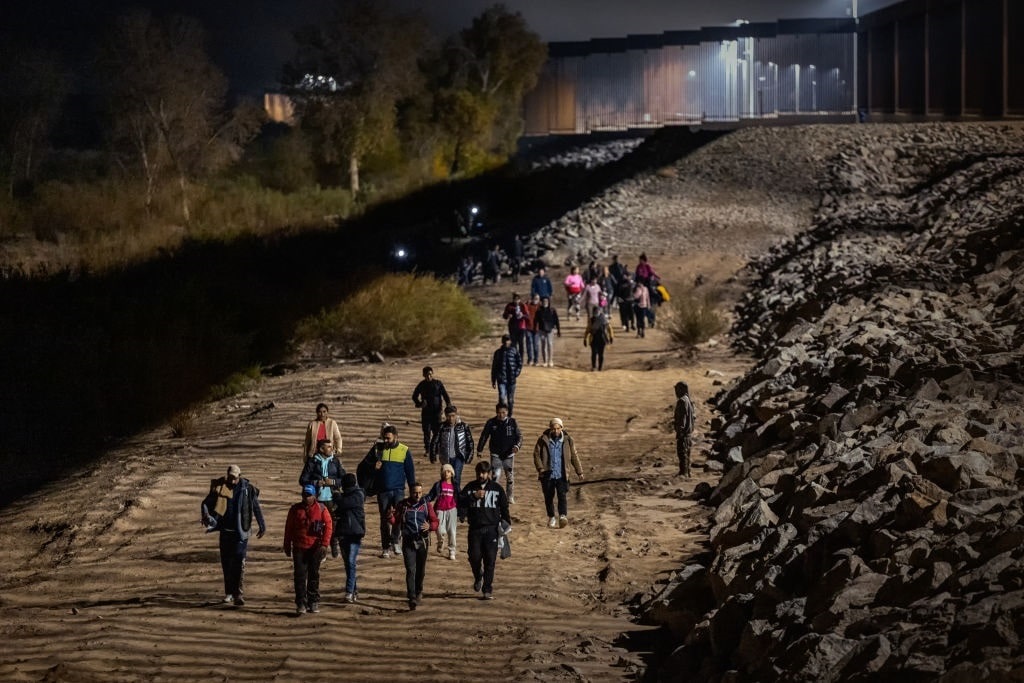Winter is coming, and Chicago Mayor Brandon Johnson is scrambling to find housing for the influx of migrants descending on the Windy City. The leader’s idea, though, isn’t gaining favor across the board. Some argue putting immigrants in tent cities, even heated, is a recipe for disaster.
Migrants in Tents During the Winter
Johnson is tasked with a problem many border states and cities have faced for a long time: what to do with all the migrants flooding into the area. With nearly 1,600 currently living in the city’s police stations, something needs to be done to find a place for these people.
Enter Mayor Johnson’s big plan. The idea is to set up housing in tents that can accommodate anywhere from 500 to 1,000 people. The “winterized base camps” are massive enclosures that will be heated and where inhabitants will receive three nutritious meals a day plus entertainment and medical care. “We are moving with expediency because the weather is going to be shifting very soon, so before inclement weather sets in, we fully expect to have these base camps established,” Johnson said. But an editorial in the Chicago Sun-Times remarked:
“Let’s be blunt: Housing hundreds of migrants in tents — even high-quality, military-grade tents — as another Chicago winter approaches strikes us as a bad idea that could quickly go terribly wrong.”
Chicago temperatures can reach from the low 50s in October to low 20s by January. And, lest we forget, it is not called the Windy City for nothing. A little bit of trivia here: The nickname started in 1876 by the Cincinnati Enquirer to describe a tornado that hit the area and also to make fun of the double meaning referring to local speakers who were considered “full of wind.” Chicago is windy, though, ranked 12th windiest in the nation, with an average wind speed of about 10.3 miles per hour.
Putting up to 1,000 bodies inside a tent in the middle of winter may not seem like the best option, but what’s a mayor to do? “We have had more buses show up in the last 15 weeks than all of last year combined; I don’t think we should continue to look at this as a crisis. This is our reality,” Johnson said. He also disagreed with New York City Mayor Eric Adams, who warned that the 110,000 migrants who have entered his city and already cost $1.5 million would “destroy New York City … The city we knew, we’re about to lose.”

Photo by John Moore/Getty Images)
Instead, Johnson said: “I’m not going to accept the notion that the city of Chicago is going to be destroyed. We are a city of big shoulders. We’ve been through difficult moments and challenges before.” Still, he cautioned that everyone was going to have to pull together, and that there would be a cost to be shared. “There is a sacrifice that is going to be required in this moment … The sacrifices that we are prepared to make in order to ensure that this city is not chaotic and it is not riddled with desperate people,” he remarked.
City council members brought up the issue of rising crime, saying sex trafficking, drug dealing, and gang recruitment have escalated outside of the migrant shelters. Johnson had an answer for that as well, saying, “Anything absent of the type of investments that I am prepared to make and the sacrifices that I am gonna ask the city of Chicago to stand alongside me – anything short of that is going to cause and create that much more damage and chaos.”
The city is already forking out about $30 million a month to care for the 13,500 migrants already there, and that cost is expected to go up as more people cross the border and head to Chicago or are bused there by border governors. Baltazar Enriquez with the Little Village Community Council has worked with the asylum-seekers and told ABC News that he had shared more practical locations where the city could house incoming migrants:
“To us, this is another FEMA concentration camp. These camps have been a failure at the border. No rules, no real type of security … The city of Chicago has brutal winters, very hard winds, and I know these tents will be destroyed within months. Where is all this money going? We are spending tax payers’ money, and me, as a tax payer, I am very concerned that the mayor doesn’t want to talk to the community. The mayor has this plan that doesn’t want to give out the way they are going to run the camps. All they are telling us is that they are tents.”
While Johnson tries to deal with the immigrant problem, his constituents want to know what resources were being provided for the estimated 64,000 homeless Chicagoans. “I know what it’s like to have a relative, a family member who is suffering,” was his non-answer.




